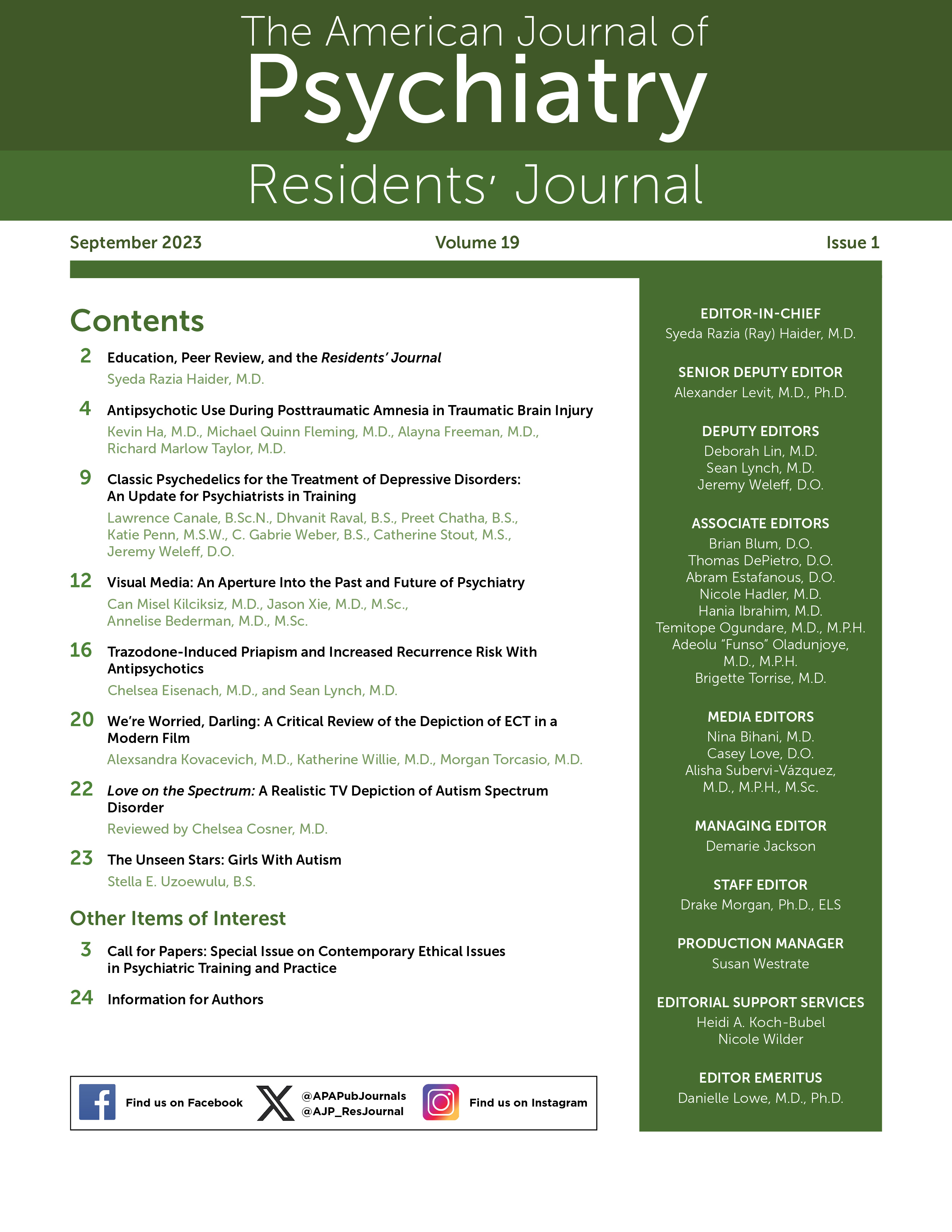Welcome to the 19th volume of the American Journal of Psychiatry Residents’ Journal (AJP-RJ)! We are a trainee-led, peer-reviewed publication of the American Psychiatric Association (APA). Since its inception in 2006, AJP-RJ has been a valuable resource for medical students, residents, and fellows across North America. We provide a dedicated space for trainees to share their experiences in psychiatry and develop their writing skills through our collaborative peer review process.
My introduction to AJP-RJ started with a copy of an issue sent out by my program director during my intern year. The interesting and concise pieces meant that I could stay up-to-date by reading the journal cover-to-cover in my limited downtime. I appreciated that AJP-RJ integrated scientific articles, clinical case discussions, and humanities to provide a well-rounded complement to psychiatric training. I applied to be on the editorial board of AJP-RJ during my second postgraduate year in the hopes of learning more about the publication process.
During my time on the editorial board, I have honed my peer-reviewing and editing skills under the mentorship of our two most recent editor-in-chief emeriti, Danielle Lowe, M.D., Ph.D., and Austin Blum, M.D., J.D. I am extremely grateful for the opportunities they gave me. As I embark on my third year of working with AJP-RJ, now as editor-in-chief, I am excited to continue advancing the educational mission of the journal with this year’s senior deputy editor, Alexander Levit, M.D., Ph.D. I am also looking forward to working with our new 2023–2024 editorial board members who were recruited from a large pool of highly qualified applicants.
Peer review is an important part of the academic publication process. Involvement in this process helps to develop critical thinking and communication skills that are necessary for psychiatry trainees. Yet, many trainees graduate residency with limited experience in peer review.
AJP-RJ provides ample opportunities for residents and fellows to engage with the peer review process (
1,
2). Our editorial board members experientially learn to evaluate their peers’ works and convey written recommendations for manuscript improvement. To provide didactic education on the peer review process, Dr. Lowe and I developed a workshop on the process last year. We subsequently presented this workshop at multiple psychiatry training programs across the country. Our editorial board also presented a workshop titled “Over the Finish Line: Maintaining Motivation in Academic Writing with the AJP Residents’ Journal” at the APA Annual Meeting in San Francisco in May 2023. I hope to expand our outreach this year by providing similar workshops on academic writing and peer review at other institutions across the country. I encourage readers to take advantage of the opportunity for experiential learning we provide by applying for editorial board positions when we send out our call for applications later this year.
Lastly, I want to express gratitude toward our 2022–2023 editorial board for their dedication to
AJP-RJ over the past year. Thanks to their hard work, the current issue is an excellent example of the diversity of manuscripts that attracted me to
AJP-RJ; this issue features psychopharmacology literature reviews, history of film and psychiatry articles, Arts and Culture pieces on autism, and a case report authored by one of our deputy editors. Our media editors have released several thoughtful podcast episodes over the past year, including recent ones on psychodynamic psychiatry and humility in psychiatry. I invite you all to peruse the papers within this issue, listen to our podcast, and participate in this collaborative space by submitting manuscripts (see
p. 24 for submission information).
